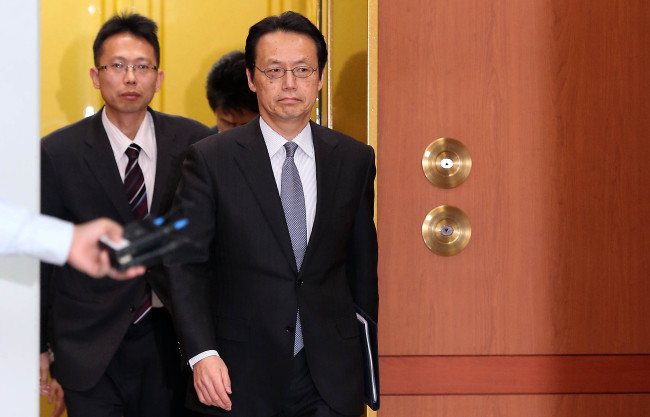Japan stokes territorial tension
Seoul condemns Tokyo’s renewed Dokdo claim in its foreign policy report
By Shin Hyon-heePublished : April 7, 2015 - 20:50
Japan again reasserted its sovereignty over the easternmost Korean islets of Dokdo in an annual diplomatic paper Tuesday, further stoking territorial tension that has dogged bilateral ties for decades.
Japan’s Foreign Minister Fumio Kishida reported the 2015 edition of the Diplomatic Bluebook to the Cabinet, which claims that the islets are its “inherent territory” based on history and international law.
Seoul’s Foreign Ministry instantly protested the announcement, calling in Kenji Kanasugi, a minister at the Japanese Embassy here.
“No matter how much the Japanese government repeats its preposterous claims, the historical truth cannot be erased or changed that Dokdo, which is our indigenous territory, was the first victim of Imperial Japan’s aggression on the Korean Peninsula, and that the victims of the Japanese military’s sex slavery were forcefully conscripted and suffered from unspeakable pain and wounds,” the ministry said in a statement.
Japan’s Foreign Minister Fumio Kishida reported the 2015 edition of the Diplomatic Bluebook to the Cabinet, which claims that the islets are its “inherent territory” based on history and international law.
Seoul’s Foreign Ministry instantly protested the announcement, calling in Kenji Kanasugi, a minister at the Japanese Embassy here.
“No matter how much the Japanese government repeats its preposterous claims, the historical truth cannot be erased or changed that Dokdo, which is our indigenous territory, was the first victim of Imperial Japan’s aggression on the Korean Peninsula, and that the victims of the Japanese military’s sex slavery were forcefully conscripted and suffered from unspeakable pain and wounds,” the ministry said in a statement.

Unlike last year, the latest text leaves out the description that the two nations “share fundamental values such as freedom, democracy and respect for basic human rights, and common interests in maintaining regional peace and security,” though it still says that they are “the most important neighboring countries to each other.”
On the issue of Japan’s wartime sexual slavery, it reiterated Tokyo’s long-held position that the dispute has already been settled and introduced previous efforts to appease the victims such as through the 1995 Asian Women’s Fund.
The document is expected to intensify their territorial brawl, dealing a fresh blow to Seoul’s efforts to mend the relationship ahead of the 50th anniversary of its normalization.
One day earlier, Japan’s Education Ministry certified 18 updated versions of geography, social studies and history middle school textbooks, most of which newly added stronger claims to Dokdo. Seoul’s Vice Foreign Minister Cho Tae-yong summoned Japanese Ambassador Koro Bessho to lodge a protest and warn about the diplomatic paper.
Kishida and Japan’s Cabinet Secretary Yoshihide Suga refuted Korea’s complaint over the textbooks, calling it “unacceptable.”
“The decision was made fairly and neutrally based on professional and scholarly deliberations,” Suga said at a news briefing on Tuesday.
Introduced in 1957, the bluebooks have in recent years carried the argument as part of Tokyo’s diplomatic activities and the regional and global security landscapes.
Yet the Shinzo Abe administration has been ramping up its sovereignty assertion since its launch in December 2012. It has since installed within the cabinet secretary’s office a bureau solely in charge of territorial policy, revised teaching and schoolbook guidelines and multiplied expenses for promotion at home and abroad and propping up lobbying targeting foreign governments.
The drive is also aimed at better coping with Japan’s territorial row with China over the Senkaku or Diayou islands in the East China Sea.
For the first time, the full version of the bluebook will be translated into English for wider distribution this year, while dozens of past official documents and news articles are to be available in an online archive.
With Tokyo spurring its campaign, Seoul is stepping up intra-agency efforts to better respond through stern diplomatic measures, improved public promotion and more thorough academic analysis. Experts have called for the government to formulate a more multifaceted approach and beef up its logic especially from the aspect of international law.
The Foreign Ministry, for instance, launched websites in Italian, Portuguese and Hindi on Monday to raise awareness about Dokdo and Korea’s sovereignty overseas, bringing the number of available languages to 11.
The Education Ministry plans to release a new curriculum policy as early as this month for elementary, middle and high schools so that future editions of textbooks contain more detailed and strengthened statements on Dokdo and Japan’s wartime sex slavery. While overhauling the country’s Dokdo education, it will also distribute teaching materials on the comfort women issues soon in collaboration with the Ministry of Gender Equality & Family, officials said. More exhibitions are expected to take place for the public.
The National Assembly, for its part, is exploring ways to support the cause such as by adopting a resolution condemning Japan’s distortion of history and taking other legislative steps to reinforce government activities and enhance public education.
“We need a two-track policy that we maintain our firm stance regarding territorial and historical matters, but pursue cooperation in areas that benefit both countries,” a Foreign Ministry official said, requesting anonymity due to the sensitivity of the subject.
By Shin Hyon-hee heeshin@heraldcorp.com)








![[Graphic News] More Koreans say they plan long-distance trips this year](http://res.heraldm.com/phpwas/restmb_idxmake.php?idx=644&simg=/content/image/2024/04/17/20240417050828_0.gif&u=)
![[KH Explains] Hyundai's full hybrid edge to pay off amid slow transition to pure EVs](http://res.heraldm.com/phpwas/restmb_idxmake.php?idx=644&simg=/content/image/2024/04/18/20240418050645_0.jpg&u=20240419100350)





![[From the Scene] Monks, Buddhists hail return of remains of Buddhas](http://res.heraldm.com/phpwas/restmb_idxmake.php?idx=652&simg=/content/image/2024/04/19/20240419050617_0.jpg&u=20240419175937)

![[KH Explains] Hyundai's full hybrid edge to pay off amid slow transition to pure EVs](http://res.heraldm.com/phpwas/restmb_idxmake.php?idx=652&simg=/content/image/2024/04/18/20240418050645_0.jpg&u=20240419100350)

![[Today’s K-pop] Illit drops debut single remix](http://res.heraldm.com/phpwas/restmb_idxmake.php?idx=642&simg=/content/image/2024/04/19/20240419050612_0.jpg&u=)